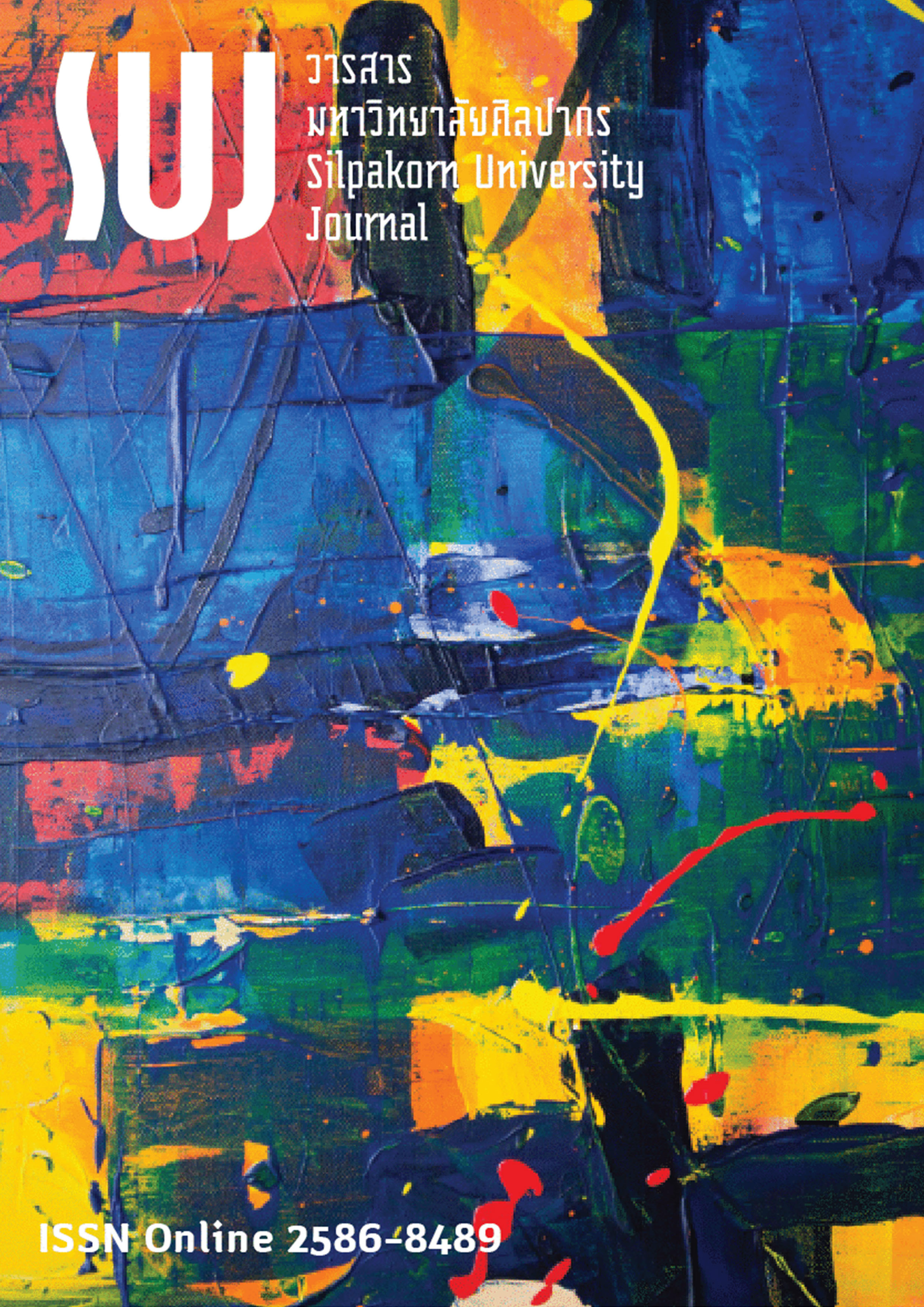รูปแบบการพัฒนาทักษะดิจิทัลของผู้บริหารสถานศึกษาสังกัดสำนักงานคณะกรรมการการอาชีวศึกษา เพื่อก้าวสู่ชีวิตวิถีถัดไป (A model for digital skill development of school administrators under the Office of Vocational Education Commission in the next normal)
Main Article Content
Abstract
งานวิจัยเรื่องนี้มีวัตถุประสงค์ 1) เพื่อศึกษาและยืนยันองค์ประกอบทักษะดิจิทัล 2) เพื่อพัฒนารูปแบบการพัฒนาทักษะดิจิทัล 3) เพื่อนำรูปแบบการพัฒนาทักษะดิจิทัล ไปทดลองใช้ในสถานศึกษา กลุ่มตัวอย่าง ได้แก่ ผู้บริหารสถานศึกษาในสำนักงานคณะกรรมการการอาชีวศึกษา จำนวน 459 คน ผู้ทรงคุณวุฒิ จำนวน 9 คน เครื่องมือที่ใช้ในการวิจัย ได้แก่ แบบสอบถาม แบบสัมภาษณ์ แบบทดสอบ แบบประเมินรูปแบบ และแบบประเมินความพึงพอใจ สถิติที่ใช้ในการวิเคราะห์ข้อมูล ได้แก่ ค่าความถี่ ค่าร้อยละ ค่าเฉลี่ย ค่าส่วนเบี่ยงเบนมาตรฐาน ค่า t-test แบบ Dependent samples และการวิเคราะห์เนื้อหา ผลการวิจัย พบว่า 1) องค์ประกอบทักษะดิจิทัลของผู้บริหารสถานศึกษา สังกัดสำนักงานคณะกรรมการการอาชีวศึกษาเพื่อก้าวสู่ชีวิตวิถีถัดไป 5 ด้าน ได้แก่ ความสามารถ ความรู้ ประสบการณ์ คุณลักษณะ และสมรรถนะ ผลการตรวจสอบความตรงของรูปแบบ พบว่า รูปแบบมีความสอดคล้องกลมกลืนกับข้อมูลเชิงประจักษ์ โดยมีค่า Chi-square = 1.76 ค่า p = 0.18405 ค่า df = 1 ค่ารากของค่าเฉลี่ยความคลาดเคลื่อนกำลังสองของการประมาณค่า (RMSEA) = 0.056 ดัชนีวัดระดับความสอดคล้องเหมาะสม (GFI) = 1 2) ผลการพัฒนารูปแบบการพัฒนาทักษะดิจิทัลของผู้บริหาร ประกอบด้วย หลักการ วัตถุประสงค์ องค์ประกอบทักษะดิจิทัล กระบวนการพัฒนา การประเมินผลการดำเนินการและเงื่อนไขความสำเร็จ รูปแบบมีความเหมาะสมและความเป็นไปได้อยู่ในระดับมากที่สุด 3) ผลการนำรูปแบบการพัฒนาทักษะดิจิทัลของผู้บริหารสถานศึกษา ไปทดลองใช้ในสถานศึกษา พบว่า ผลการทดสอบความรู้ความเข้าใจทักษะดิจิทัลของผู้บริหารสถานศึกษา หลังการใช้รูปแบบการพัฒนาฯ มีคะแนนสูงกว่าก่อนการใช้รูปแบบการพัฒนาฯ อย่างมีนัยสำคัญทางสถิติที่ระดับ 0.05 และผลการประเมินความพึงพอใจรูปแบบการพัฒนาทักษะดิจิทัลของผู้บริหารสถานศึกษาอยู่ในระดับมากที่สุด ซึ่งรูปแบบนี้สามารถนำไปใช้ในการพัฒนาทักษะดิจิทัลของผู้บริหารสถานศึกษาสังกัดสำนักงานคณะกรรมการการอาชีวศึกษาและหน่วยงานอื่นได้อย่างมีประสิทธิภาพเพื่อให้เกิดประสิทธิผลต่อการบริหารจัดการในสถานศึกษาต่อไป
This research aimed to 1) investigate and confirm the digital skill components, 2) construct a model for digital skill development, and 3) test a model of digital skill development in schools. The sample consisted of 459 school administrators in the Office of the Vocational Education Commission and nine experts. The research tools were questionnaires, interview forms, test forms, model-assessment forms, and satisfaction assessment forms. The statistics used for data analysis were frequency, percentage, mean, standard deviation, t-tests on dependent samples, and content analysis. The results revealed that 1) the five digital skill components of school administrators under the Office of Vocational Education Commission in the next normal were capability, knowledge, experience, attribute, and competency. The model validity (Chi-square = 1.76, p = 0.18405, df = 1, RMSEA = 0.056, GFI = 1) fitted the empirical data; 2) the results of a constructed model for digital skill development by school administrators which consisted of principles, objectives, digital skill components, development process, performance assessment, and success conditions displayed the highest level of suitability and feasibility; and 3) the results of a model test in schools showed that the cognitive and digital skills of school administrators after using the development model had a higher score than before using the model with statistical significance at the 0.05 level. The results of the satisfaction assessment on digital skill development were at the highest level. This model can be effectively applied to develop the digital skills of school administrators under the Office of the Vocational Education Commission and other agencies which, therefore, contributes to efficient school management in the future.
Downloads
Article Details

This work is licensed under a Creative Commons Attribution-NonCommercial-NoDerivatives 4.0 International License.
References
American Library Association. (2013). Digital Literacy, Libraries, and Public Policy: Report of the Office for Information Technology Policy’s Digital Literacy Task Force. [Online]. Retrieved June 2, 2022, from https://alair.ala.org/bitstream/handle/11213/16261/2012_OITP_digilitreport_1_22_13_Marijke%20Visser.pdf?sequence=1&isAllowed=y
Announcement of the Ministry of Education: Policy and Focus of the Ministry of Education Academic Year 2020 (ประกาศกระทรวงศึกษาธิการ เรื่อง นโยบายและจุดเน้นของกระทรวงศึกษาธิการ ปีงบประมาณ พ.ศ. 2563). (2019, August 21). [Online]. Retrieved June 9, 2020 from https://www.bkkedu.in.th/wp-content/uploads/2020/04/นโยบายและจุดเน้นของกระทรวงศึกษาธิการ-ปีงบประมาณ-พ.ศ.-2563.pdf
Asawapoom, Saman. (2007). The use of research develops patterns in doctoral dissertations (การใช้วิจัยพัฒนารูปแบบในวิทยานิพนธ์ระดับปริญญาเอก). Journal of Ubon Ratchathani Rajabhat University, 2(2): 76-85.
Falloon, G. (2020). From digital literacy to digital competence: The teacher digital competency (TDC) framework. Educational Technology Research and Development, 68(5): 2449-2472.
Ministry of Digital Economy and Society. (2018). Digital Literacy (ความเข้าใจดิจิทัล). Bangkok: Office of the National Digital Economy and Society Commission.
Ministry of Education (2008). Basic Education Core Curriculum B.E. 2551 (A.D. 2008). Bangkok: Bureau of Academic Affairs and Educational Standards, Office of the Basic Education Commission.
Ministry of Information and Communication Technology. (2016). Digital Development for National Economic and Social Development (แผนพัฒนาดิจิทัลเพื่อเศรษฐกิจและสังคม). Bangkok: Ministry of Information and Communication Technology.
Office for National Education Standards and Quality Assessment (Public Organization). (2021). Framework for the External Quality Assurance for Vocational Education (กรอบการประกันคุณภาพภายนอกสำหรับอาชีวศึกษา). [Online]. Retrieved May 10, 2022 from https://www.onesqa.or.th/en/profile/1290
Office of the Civil Service Commission (OCSC). (2019). What is Digital Literacy? (Digital Literacy คืออะไร). [Online]. Retrieved May 10, 2022 https://www.ocsc.go.th/DLProject/mean-dlp
Padiworn, Nanthida, Boonrom, Phanupong, & Singpan, Pongtorn. (2021). Model of development digital technology skills for school administrators under the Office of the Basic Education Commission (รูปแบบการพัฒนาทักษะด้านเทคโนโลยีดิจิทัลของผู้บริหารสถานศึกษา สังกัดสำนักงานคณะกรรมการการศึกษาขั้นพื้นฐาน). Journal of MCU Peace Studies, 9(5): 1927-1939.
Pirzada, K., & Khan, F. N. (2013). Measuring relationship between digital skills and employability. European Journal of Business and Management, 5(24): 124-133.
Riel, J., Christian, S., & Hinson, B. (2012). Charting Digital Literacy: A Framework for Information Technology and Digital Skills Education in the Community College. Presented at Innovations 2012 hosted by the League for Innovation in the Community College. Philadelphia, PA. March 5-9.
Sánchez-Cruzado, C., Campión, R. S., & Sánchez-Compaña, M. T. (2021). Teacher digital literacy: The indisputable challenge after COVID-19. Sustainability, 13: 1858.
Tabieh, A. A. S., Hamzeh, M., Abu-Foudeh, B. Kh. S., Jarrar, N., Al-Manaseer, S., Al-Shawabkeh, A., & Seikaly, R. (2021). Digital literacy and its acquisition by teachers and principals at educational workplaces. International Journal of Learning, Teaching and Educational Research, 20(5): 38-55.
Van Laar, E., Van Deursen, A. J. A. M., Van Dijk, J. A. G. M., & De Haan, J. (2017). The relation between 21st-century skills and digital skills: A systematic literature review. Computers in Human Behavior, 72: 577-588.


